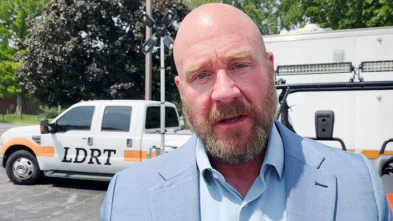State Representative Michael Coffey (IL) | Representative Michael J. Coffey, Jr. (R) 95th District
State Representative Michael Coffey (IL) | Representative Michael J. Coffey, Jr. (R) 95th District
On September 18, Illinois courts ceased to enjoy the power to demand that accused criminal defendants post cash bail. Pointing to the radical nature of the change in Illinois pretrial procedure, the international newsweekly “The Economist” ran a story, datelined in Chicago, that was headlined “Ending cash bail: Busting out.” The widely-read magazine/online news service alluded to “the fear that dangerous criminals will be let free,” as the courts will no longer have the legal right to detain them during the substantial lengths of time (often greater than 12 months) that separate the arrest and the criminal trial.
Representative Coffey expressed concern over the new policy, stating, "It’s clear these 'soft-on-crime' policies are enticing criminals to engage in activity that puts our communities at-risk. We are in dire need of leaders who will uphold our laws that put criminals behind bars. Prosecutors also need to step-up and send a strong message to criminals that their actions will not be tolerated by the courts."
Many Illinois state’s attorneys share these concerns. On Saturday, September 23, Robert Berlin, the DuPage County state’s attorney, pinpointed a case in which DNA from a $68,000 robbery crime scene matched the name and identity of Terry Johnson, a man who had previously been granted parole for armed robbery and aggravated battery. Despite this status, when Johnson appeared before a court hearing last week on the most recent robbery case, the judge granted pretrial release to him. Berlin told Chicago’s ABC-7 that the judge who was hearing Johnson’s pretrial release status “felt his hands were tied because of the [cash bail] law.” Although Johnson has now promised to cooperate with the court and attend his future status hearings, Berlin pointed out the defendant’s prior criminal record and history.
In another case last week, while carrying out a traffic stop on Interstate 80 near Geneseo, the Illinois State Police deployed a K-9 assistance unit. The canine officer alerted law enforcement, and a vehicular search revealed 5,321 pounds of cannabis. The two-ton cargo, a volume that was more than 28 times the largest (Class X felony) volume category contained within Illinois’ Cannabis Control Act charging sheets, led to the arrest of the two defendants who were occupying the vehicle at the time of the traffic stop. However, under the terms of Illinois’ new no-cash-bail law, when the two men appeared before a Henry County court, the two defendants were released pending trial. Their court appearance took place on Thursday, September 21.
ENERGY
Proposed Gotion battery factory raises concerns. Proponents point to the new jobs that would be created in Manteno, Illinois, should the proposed plant be built in line with the September 2023 announcement. As additional facts about the proposed factory come to light, however, questions are being askedThe proposed Gotion factory complex would build lithium-ion battery packs and battery cells. It is expected that many of these production units would be used to power electric vehicles (EVs). Illinois is under pressure to accept a stake in the fast-growing EV market. Many concerns are being raised over this pressure and the specifics of this deal. The State of Illinois, and local governments in and around Manteno, have pledged a package of incentives that is currently valued at $536 million over the long-term operation of the proposed factory complex. However, it is not known when the proposed factory complex will be built and go into production, and no public consultations took place prior to announcement of the deal and package.
FIRST RESPONDERS
Shortage seen of future Illinois volunteer firefighters. Hundreds of thousands of Illinoisans live in volunteer fire protection districts. These districts cover more than half of the land of Illinois. They protect our families and properties against emergency events that take place outside the boundary lines of a full-time fire protection district. For more than a century, since the invention of the affordable motor car, Illinoisan in many Downstate and rural areas have been able to depend on rapid-movement volunteers to perform the essential works of firefighting and emergency response.An investigative report published in the Chicago Tribune indicates that this personnel model could be on the verge of breaking down. The overall shortage of U.S. and Illinois labor, combined with ever-increasing mandates imposed on emergency responders to learn and be certified in essential tasks, is making recruitment of new volunteer firefighters very challenging in many fire protection districts. Well-meaning mandates, and their agents, are continually trying to teach Illinois first responders new tasks and responsibilities. New toxic chemicals, which firefighters must protect themselves against, are being developed and distributed. New advances in emergency medical response science are increasing the burdens on those first responders who are keeping up their medical certifications.
In addition to these underlying trends, the ever-growing percentage of Illinoisans who are senior citizens, particularly in many rural and Downstate areas, is increasing the load on first responders – especially those first responders who among the diminishing population of rural Illinois who are young adults. Volunteer firefighters are customarily compensated by payments of their expenses plus stipends, but a typical paid-out stipend is incurred by the emergency call. The typical stipend structure for a volunteer firefighter, or non-firefighter first responder, falls far short of what full-time compensation would be.
A new law, passed by the General Assembly earlier this year, appreciates Illinois’ volunteer first responders by the creation of a State income tax credit of up to $500 per income tax filer. Eligible for the credit are first responders who earn less than $5,000 a year in stipends for services provided to a fire protection district. The new income tax credit was created as part of SB 1963, signed into law in June as Public Act 103-9. The Tribune investigative report was published on Sunday, September 24.
JOBS
Illinois jobless rate rose to 4.1% in August 2023. The change from 4.0% in July 2023 signals a turn away from so-called “full employment” in Illinois. “Full employment” is defined as an unemployment rate of less than 4.0%. Many states that neighbor Illinois currently have full employment; examples include Indiana (3.4% in August 2023), Missouri (2.8% in August), and Wisconsin (2.9% in August).The August 2023 4.1% unemployment rate reflects Illinois’ statewide net job losses in professional and business services (net 3,300 jobs lost in August 2023, relative to July 2023), and trade, transportation, and utilities (net 1,100 jobs lost). These trends reflect continued rationalization and productivity-sizing among professional partnerships, firms that provide consultancy and information services to business, and retail firms. These are areas where computer software and artificial intelligence, including computer software that operates online to target and sell goods andClick this link to access more information: https://repcoffey.com/2023/10/06/catching-up-with-coffey-19/






 Alerts Sign-up
Alerts Sign-up